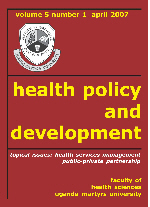
|
Health Policy and Development
Department of Health Sciences of Uganda Martyrs University
ISSN: 1728-6107
EISSN: 1728-6107
Vol. 2, No. 1, 2004, pp. 48-51
|
 Bioline Code: hp04012
Bioline Code: hp04012
Full paper language: English
Document type: Research Article
Document available free of charge
|
|
|
Health Policy and Development, Vol. 2, No. 1, 2004, pp. 48-51
| en |
Voting with their feet: what lessons can be learnt from increased consumption of public services in Uganda?
Yates, Rob
Abstract
Uganda is a long way off achieving its Millennium Development Goals (MDGs). Persistently high child and maternal mortality reflect to some extent the poor performance of the health sector. The poor health service performance is itself a reflection of the chronic low expenditure on health and the inefficiency in the way in which resources are raised, allocated and managed. However, since 2000, there has been a small revolution in the health sector. Through sector wide approach, (SWAP) and the abolition of user fees, basic services have improved significantly and the use of public services has dramatically increased, as indicated by the doubling of outpatient attendances and immunization rates. The lesson learnt here is that a Government led SWAP can deliver significant social benefits. The budget support method is ultimately a more efficient way of financing social services than project funding or user fees. Investment in SWAP and sector targeted technical assistance in addition to budget support are the critical factors in the health sector revolution.
|
| |
© Copyright 2004 - Department of Health Sciences of Uganda Martyrs University
Alternative site location: http://www.fiuc.org/umu/faculties/hsm/healthpolicy/index.html
|
|
